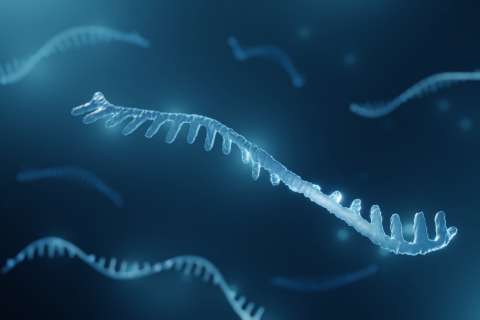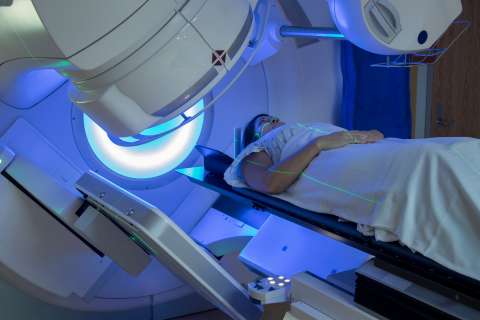
Joanne B. Weidhaas, MD, PhD, MBM
Languages
Education
Fellowship
Internship
Degrees
Residency
Board Certification
Contact Information
Phone
Clinical Interests
Scientific Interests
Dr. Joanne Weidhaas' research seeks to significantly improve personalized treatment and ultimate outcomes for cancer patients by breaking down the barriers between science and clinical care. By focusing on overall tumor biology and specifically the discovery and characterization of functional germ-line genetic markers that predict cancer risk, her lab seeks to facilitate insight into the causes and fundamental driving biology behind cancer.
Current goals include the study of microRNAs (miRNAs), work that builds upon her earlier research that revealed that miRNAs are dynamically regulated in response to cancer treatment. This meaningful advance in the understanding of the role of miRNAs in cancer led to her discovery of the first germ-line miRNA binding site mutation, an inherited variant in the 3' untranslated region (3'UTR) of the KRAS oncogene. This mutation, now referred to as the KRAS-variant, increases cancer risk and also predicts unique tumor biology, partly through conserved miRNA and gene expression changes in the tumors of patients that harbor it. This work has further been shown to result in altered response to cancer treatment for these patients (who represent 25 percent of newly diagnosed cancer patients), indicating that the KRAS-variant is a strong candidate as a predictive biomarker to direct therapeutics. She has also identified numerous additional mutations that have a similar function.
Weidhaas believes that this new class of inherited mutation is a unique opportunity to advance personalized medicine. By achieving this goal with such markers and incorporating cost-saving diagnostics into clinical practice, she hopes to overcome both the inherent business challenges of delivering diagnostics and the significant limitations of our current medical system. It is only by understanding how to best approach these obstacles and develop new strategies to overcome them that important genetic discoveries for patients can be translated from the lab to the clinic. As head of Translational Research at UCLA, Weidhaas continues to advance the integration of genetics into real-time clinical care for patients.
Highlighted Publications
Paranjape T, Heneghan H, Lindner R, Keane FK, Hoffman A, Hollestelle A, Dorairaj J, Geyda K, Pelletier C, Nallur S, Martens JW, Hooning MJ, Kerin M, Zelterman D, Zhu Y, Tuck D, Harris L, Miller N, Slack F, Weidhaas J. A 3'-untranslated region KRAS variant and triple-negative breast cancer: a case-control and genetic analysis. Lancet Oncol. 2011 Apr;12(4):377-86. doi: 10.1016/S1470-2045(11)70044-4. Epub 2011 Mar 22.
Ratner E, Lu L, Boeke M, Barnett R, Nallur S, Chin LJ, Pelletier C, Blitzblau R, Tassi R, Paranjape T, Hui P, Godwin AK, Yu H, Risch H, Rutherford T, Schwartz P, Santin A, Matloff E, Zelterman D, Slack FJ, Weidhaas JB. A KRAS-variant in ovarian cancer acts as a genetic marker of cancer risk. Cancer Res. 2010 Aug 15;70(16):6509-15. doi: 10.1158/0008-5472.CAN-10-0689. Epub 2010 Jul 20.
Chin LJ, Ratner E, Leng S, Zhai R, Nallur S, Babar I, Muller RU, Straka E, Su L, Burki EA, Crowell RE, Patel R, Kulkarni T, Homer R, Zelterman D, Kidd KK, Zhu Y, Christiani DC, Belinsky SA, Slack FJ, Weidhaas JB. A SNP in a let-7 microRNA complementary site in the KRAS 3' untranslated region increases non-small cell lung cancer risk. Cancer Res. 2008 Oct 15;68(20):8535-40. doi: 10.1158/0008-5472.CAN-08-2129.
Weidhaas JB, Babar I, Nallur SM, Trang P, Roush S, Boehm M, Gillespie E, Slack FJ. MicroRNAs as potential agents to alter resistance to cytotoxic anticancer therapy. Cancer Res. 2007 Dec 1;67(23):11111-6.
Weidhaas JB, Eisenmann DM, Holub JM, Nallur SV. A Caenorhabditis elegans tissue model of radiation-induced reproductive cell death. Proc Natl Acad Sci U S A. 2006 Jun 27;103(26):9946-51. Epub 2006 Jun 20.
In the News


